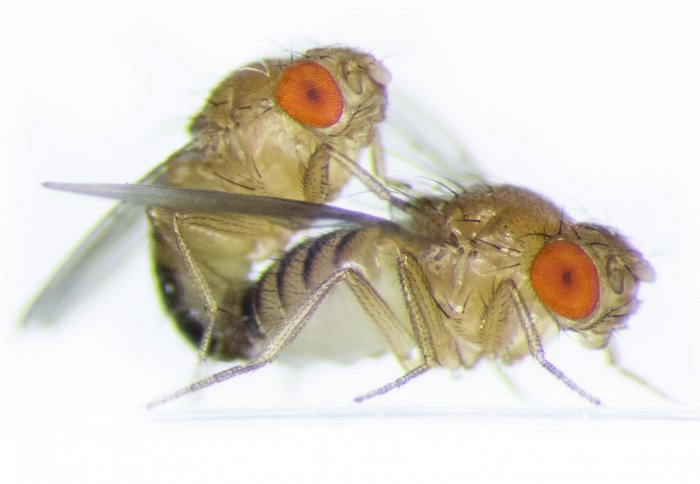Female fruit flies become more aggressive towards each other after sex

Photo: Amy Hong
Chemicals in male fruit flies' semen cause females to become more aggressive and intolerant towards each other after mating, research reveals.
Studies in many animal species have shown a direct link between increased levels of aggression in females and reproduction and egg laying. This is thought to be because the females compete more strongly for food to help support the growth of fertilised eggs, and also because they want to protect and provide for their offspring.
These experiments in fruit flies take things a step further by revealing the underlying causes, and showing the importance of biochemical factors in producing behavioural changes in females.
– Dr Joe Tobias
However, the precise factors that cause such dramatic behavioural changes have, until now, been less clearly understood. Scientists have proposed two main possibilities: the changes are triggered either by the cost of producing eggs, or by some factor associated with mating itself.
Now, in research published today in Nature Ecology & Evolution, a team of researchers from Oxford University and Imperial College London have determined that levels of female aggression soar after sex as a result of a variety of proteins found in male semen, which stimulate dramatic behavioural and physiological changes in females.
The team of researchers, led by Dr Eleanor Bath and Dr Stuart Wigby at Oxford University, and including Dr Joe Tobias from the Department of Life Sciences at Imperial, examined hundreds of fruit flies after mating. They assessed the impact of mating on female fruit fly behaviour, and to what degree it alters their levels of aggression.
Fighting for food
The researchers confined pairs of females to a small area with a single food source and observed how much they fought. Results showed that mated females fought significantly longer and harder than virgins.
The findings showed that after mating, female fruit flies become more aggressive towards each other when fighting over food, often head-butting and swatting at each other. Specifically, contests between mated females, or involving at least one mated female, were significantly more violent than contests between virgin females.
These behavioural changes were apparently triggered by proteins found in the seminal fluid, such as the sex peptide, which is carried in the seminal fluid and binds to sperm. Using genetically engineered sperm-less males and egg-less females, the team were able to determine that only females receiving sperm increased their aggression after mating, and this occurred even when females did not produce eggs.
Finding out about females
Dr Bath said: “We still know relatively little about the evolution of female aggression and the extent to which it benefits females. This is largely because it is hard topic to study, but experiments on fruit flies can allow us to tease apart the factors involved simply because we can control for different possibilities in a laboratory setting.”
Dr Tobias, who helped devise and supervise the study, said: “Biologists have only recently made progress in working out how evolutionary pressures relate to females, and in general this has mainly involved describing behavioural patterns or responses. These experiments in fruit flies take things a step further by revealing the underlying causes, and showing the importance of biochemical factors in producing behavioural changes in females.”
Increased post-coital levels of aggression may have wider indirect implications for female competition. Previous research has shown that females of many species experience a number of dramatic changes after mating, including increasing their levels of egg production, increasing their feeding rates, and altering their sleeping patterns.
Copulation may also affect the social tolerance of females in general. Immediately after mating, for example, female fruit flies are known to reject male advances and apparently lose interest in sex.
Sex pest control
Now that the relationship between mating and aggression in females is better understood, the team intend to conduct further analysis into the effects of the behavioural change, pinpointing the exact time that their intolerance intensifies, and how long the effects of the sex peptide last.
Dr Eleanor Bath said: “Knowing whether female aggression benefits females in the wild could help us to understand fruit fly population dynamics. Potentially having more aggressive females might result in females doing less well in the wild, meaning that we could potentially use female aggression as a behavioural tool to control pest insect populations.”
-
‘Sperm and sex peptide stimulate aggression in female Drosophila’, by Eleanor Bath, Samuel Bowden, Carla Peters, Anjali Reddy, Joseph A. Tobias, Evan Easton-Calabria, Nathalie Seddon, Stephen F. Goodwin and Stuart Wigby is published in Nature Ecology & Evolution.
Article text (excluding photos or graphics) © Imperial College London.
Photos and graphics subject to third party copyright used with permission or © Imperial College London.
Reporter
Hayley Dunning
Communications Division
